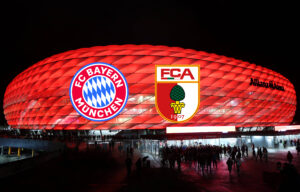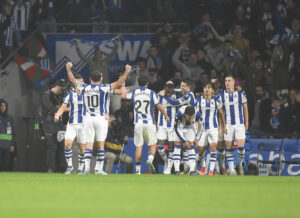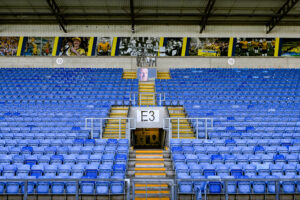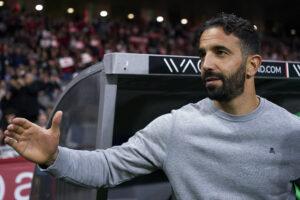We are nearly three months into the season, 18 months into the tenure of Unai Emery as manager of Arsenal, and the Gunners now find themselves at a crossroads. Saturday’s 1-1 draw at home to Wolverhampton Wanderers left them with just two wins from their last nine games and in real danger of being left behind in the race for the top four.
With the club stagnant in the latter years of Arsene Wenger’s reign, Emery was brought in to give Arsenal a new lease of life, tactical nouse and energy. Given the talented players and strong resources at the club, it seemed clear that a new voice was needed to give them a push towards competing for major honours once again.
Unai Emery Under Pressure at Arsenal
Getting Worse?
Unfortunately, it is not working out that way. In fact, there is reason to suggest that Arsenal are not just drifting under Emery, they are now getting worse. Recent results have been bad enough for a side that missed two glorious chances to return to the Champions League at the end of last season but the performances are arguably more of a concern.
Many have become confused when it comes to Emery’s vision of how he wants his side to play. The most likely answer is that he is trying to make Arsenal more pragmatic. The free-flowing football that became a feature of Arsene Wenger’s time in North London has been sacrificed at the expense of aiming to become harder to beat, both home and away.
The numbers indeed suggest that Arsenal’s attacking philosophy has now changed. They are averaging fewer passes per Premier League game (497.1) this season than Brighton & Hove Albion (509.7) and nearly all of their rivals for the top four. In addition, they rank eighth for total number of key passes (110) and in the same place for completed shots (142). The Gunners are also in the bottom half when it comes to number of high turnovers that begin within 40 metres of the opposition goal.
What Emery seems to be doing is making Arsenal into a counter-attacking side. They rank first in the Premier League for number of fast breaks and have had more direct attacks starting from their own half than any other team, according to Opta. “It’s a bad result, but tactically it worked how we wanted,” Emery said after the draw with Wolves. He strongly believes in his system.
The idea of making Arsenal a more pragmatic, counter-attacking team seems to make sense. In the last few years under Wenger, the club were consistently criticised for focusing too much on playing attractive football and not enough on becoming a more versatile side that was tougher to beat, especially on the road. When Emery arrived, that focus shifted, with more emphasis being placed on improving without the ball than with it.
Arsenal fans may have accepted sacrificing Wenger’s revolutionary passing game for becoming a tighter unit in midfield and at the back. And with the likes of Pierre-Emerick Aubameyang, who notched his 50th Arsenal goal in just 78 games at the weekend, Alexandre Lacazette, Mesut Ozil, record-signing Nicolas Pepe and the exciting young duo of Bukayo Saka and Gabriel Martinelli, an attacking threat was always set to remain.
However, the problem is that despite Emery’s efforts to work on other areas of the pitch, Arsenal are not showing any signs of defensive improvement. They rank third when it comes to shots conceded per game (16.2) in the league after averaging 13.1 last season – their highest in this decade. Against Wolves on Saturday, they conceded 25 shots – the most of any home team in the last two seasons – and 31 in September’s 2-2 at Watford – a Premier League record for this campaign.
The alarming summary is that improving the defensive side of such a fragile team is exactly what Emery was brought in to achieve. Surprisingly, since the start of the decade, Arsenal never managed to average 12 or more shots conceded per Premier League game under Wenger and placed sixth for fewest shots faced in four of his final five seasons as manager. That was seen as a team badly in decline but what is happening under Emery now seems worse.
And it’s not just the insipid attacking play or the lack of defensive progress that is causing issues. Emery’s treatment of certain players remains puzzling. His use of Lucas Torreira, the only natural holding midfielder at the club, as a box-to-box player has frustrated Arsenal fans. Meanwhile, the phasing out of Mesut Ozil has been seen as a backward step, especially with the Gunners currently creating fewer big chances (1.8) of any season since 2010/11.
Concerning Player Management
There are other problems, too. Along with the previous reluctance to bring in Kieran Tierney and Rob Holding to potentially sure up the defence, Emery’s handling of the Granit Xhaka situation has been seen as weak management and leadership. Xhaka reacted angrily to booing from the Arsenal fans after being substituted during a 1-1 draw with Crystal Palace and it remains unclear whether Emery has decided to strip the Swiss of the club captaincy.
Arsenal supporters, who pay some of the highest ticket prices in Europe, have been criticised for their treatment and, in some cases, abuse towards Xhaka, but you would forgive them for feeling immense frustration over the fact that their side look to be declining under Emery’s management. Performances are well under-par and wins this season are coming more from individual brilliance than the Spaniard’s tactics or decision making.
There is also an argument that Emery needs more time. Patience with managers in the modern game is now thinner than ever before and things did not exactly go to plan when Jurgen Klopp and Pep Guardiola began their reigns at Liverpool and Manchester City respectively. Yet the difference was that the vision and game plan under both managers was clear. With Arsenal, certain players are rumoured to have become confused over their own roles in the team, as well as the tactics being implemented.
Arsenal face Leicester City next, a team rapidly on the rise under Brendan Rodgers, and defeat at the King Power Stadium, where they have lost in their previous two visits, will see the board well and truly under the microscope during the international break. Pressure is now mounting on Unai Emery because, at the moment, he is proving to be more of a problem than a solution.
Main Photo






